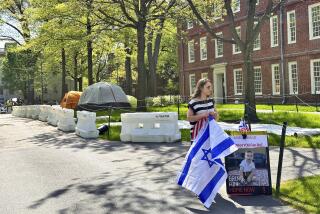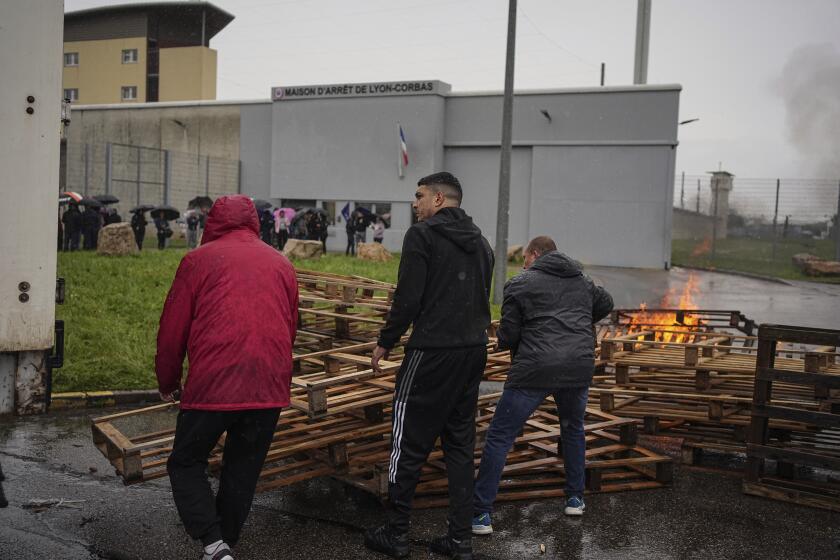Peace Plan at a ‘Critical Juncture’ After Double Suicide Bombings
Palestinian suicide bombers shattered a cease-fire with attacks on an Israeli supermarket and a Jewish settlement in the West Bank on Tuesday, delivering the sharpest blow yet to an already troubled peace process.
The strikes, carried out by a pair of teenagers, killed two Israelis, injured 11 bystanders and broke a six-week stretch during which the people of this war-weary land had enjoyed relative quiet. Palestinian and Israeli officials warned that the region risked a new cycle of bloodshed -- and they blamed each another.
Israeli Prime Minister Ariel Sharon ordered buses loaded with 76 Palestinian prisoners set for release to turn around and go back to prison. Then he threatened to abandon the frayed peace process altogether.
“The Palestinians do not do what they are supposed to do,” he said. “Israel will not be able to continue the [peace] process, despite the strong desire to do so, if the terror does not cease.”
Speaking during a tour of the Persian Gulf, Palestinian Authority Prime Minister Mahmoud Abbas condemned the bombings, but in the same breath condemned Israeli “provocations” such as a raid last week on a suspected Hamas bomb laboratory near the West Bank city of Nablus.
“We are standing tonight at a very critical juncture,” Palestinian negotiator Saeb Erekat said. Without the intervention of the United States, he warned, “things are going to go from bad to worse.”
In Washington, Secretary of State Colin L. Powell promised that the United States would continue its struggle to implement the troubled “road map” peace plan. A series of steps meant to create a safe Israel alongside a Palestinian state, the plan hasn’t spurred much action despite months of diplomacy.
“We will never get there so long as people continue to participate in terrorist activities, and we see the response to terrorist activities [that is] necessary for self-defense,” Powell said.
In the aftermath of the bombing in Rosh Haayin, 70-year-old Haim Menahem was stretched out on a hospital cot. Still dizzy from the sight of bloodied victims stumbling from the supermarket, he squinted through thick glasses and groaned.
Menahem immigrated to Israel from Yemen in 1948, spent 25 years in the army and sought a peaceful retirement in the village’s quiet hills. On Tuesday, he was being treated for shock.
“Who knew the war was going to last so long?” he said. “This keeps happening, again and again. It hurts.”
The first of the two attacks occurred here. A Palestinian teenage bomber strolled past a security guard and into a discount food store, then set off a small bomb stuffed with nails he’d tucked into a backpack. The blast killed the bomber and a 42-year-old man, Yehezkel Yekutieli, who was shopping. Nine people were wounded.
Minutes later, a second bomber detonated an explosives belt at a bus stop near the sprawling West Bank settlement of Ariel, killing himself and an 18-year-old soldier and badly wounding two bystanders.
To Israel, the attacks confirmed a long-standing complaint: that Palestinian authorities haven’t stripped militant factions such as Hamas and the Al Aqsa Martyrs Brigade of their weapons, splintered their infrastructure or jailed their members.
But Palestinians accused Israel of goading the militants with arrests, army raids and Palestinian imprisonment and by occupying the West Bank and expanding Jewish settlements in the Palestinian territories.
A three-month truce promised by the Palestinians reached its midpoint on Tuesday, but it was unclear whether it could be resurrected.
Regardless, Israeli analyst and veteran peace negotiator Yossi Beilin argued that the cease-fire is a distraction from a deeper, more serious problem: the reluctance of both sides to make serious concessions.
“The game here is very, very transparent -- the whole world is watching two parties who committed to a road map they weren’t planning to implement,” Beilin said. “I don’t see any serious peace process here. I see a hudna [cease-fire] in the background which was creating the artificial feeling of a much better situation.”
The bombers were both 17-year-old street vendors who lived a few blocks from each other in Nablus, the scene of bloody clashes Friday that killed two Hamas fighters, two Palestinian civilians and an Israeli soldier.
The suicide attacks were plotted by the Nablus branches of Hamas and Al Aqsa Martyrs Brigade in revenge, according to statements by the groups. The boys’ families said the two didn’t know each other. Despite the coincidence of time and place, it wasn’t clear whether the factions had cooperated.
A harsh military response wasn’t widely anticipated, but Israeli troops closed routes in and out of Nablus on Tuesday and imposed a curfew on surrounding West Bank villages.
“There is a continued Israeli escalation, and we have warned of the consequences,” said Mahmoud Aloul, the Palestinian governor of Nablus. “We hope to stop the collapse of the current situation.”
The Al Aqsa brigade, the military branch of Palestinian Authority President Yasser Arafat’s Fatah faction, claimed the strike on Rosh Haayin, a cluster of tidy homes near the Palestinian territories.
“The operation injured many Zionists,” Al Aqsa boasted in its statement. “There will be many martyrdom operations until we remove the occupation from our lands. Our retaliation to Sharon’s crimes and his government will be very strong.”
Hamas engineered the morning’s second bombing, according to a message faxed to news organizations in the Gaza Strip. The statement braided threats of fresh violence into assurances that the radical Islamic faction would “respect” the cease-fire.
Yohanan Tsoref, former Israeli army advisor for Arab affairs and an analyst with the International Policy Institute for Counter-Terrorism, predicted that the cease-fire would endure for the promised three months, then disappear. Palestinian factions agreed to put down their guns not because of Israeli demands, he argued, but rather in a bid for power and status in the Palestinian political realm -- a motivation that hasn’t faded.
“I don’t think we can talk about the end of the hudna, because the Palestinians still need it, but it won’t be the hudna it was before,” he said. “They are very disappointed, because they feel they got nothing from Israel. So maybe they’ll try again to give expression for their frustration and anger.”
Israeli officials have always viewed the truce by the Palestinian militants as a stopgap at best and at worst a convenient way for Abbas’ government to sidestep a widely feared civil war between militants and security services. Palestinians have made it plain that they have no intention of provoking a civil war among themselves.
More to Read
Start your day right
Sign up for Essential California for news, features and recommendations from the L.A. Times and beyond in your inbox six days a week.
You may occasionally receive promotional content from the Los Angeles Times.






